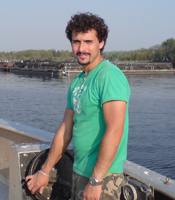AQUACULTURE STUDENT

KRIS OSUCHOWSKI
What They Are Doing Now
* Bachelor of Science, completed 2006, University of Guelph
* Master of Science, 2013, University of Guelph
Advisor: Professor Richard D. Moccia
PROJECT SUMMARY
The growth of cage aquaculture in the Great Lakes region of Ontario is constrained by a lack of policy and legislative framework regarding the management and mediation of the environmental effects associated with aquaculture waste. Identifying and differentiating aquaculture waste in the environment from other anthropogenic and natural sources is a first step in assessing the true benthic footprint of a cage site. In this study, we look at the potential use of the stable isotopes of carbon and nitrogen as natural tracers (i.e. isotopic signatures) which are known to persist in feed, feces and carcass musculature. Isotopic signatures of sediment samples from six different cage sites around Georgian Bay, Ontario, will be compared with the feed used at the sites. The effect of temperature on the fractionation of the isotopic signature in fecal samples will be assessed in the lab under different temperature regimens that reflect thermal variations observed in the field. Temperature-depth-time profiles are currently being recorded at each of several cage sites using vertical temperature logging strings. The data collected in this study is intended to help improve both farm management and the supporting policy and legislative reform aimed at enabling a sustainable aquaculture industry in Ontario.